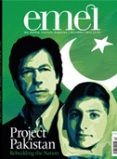
Tomorrow's World
Issue 99 December 2012
I have just finished attending a technology and innovation conference in Jeddah, Saudi Arabia. I have listened to an extraordinary array of speakers from MIT, PopTech, and Pixar.
I have just finished attending a technology and innovation conference in Jeddah, Saudi Arabia. I have listened to an extraordinary array of speakers from MIT, PopTech, and Pixar. All manner of ideas were bounced around with boundless enthusiasm, and a sense of limitless possibilities. It was with this background that I sat down to breakfast with two of the participants. We discussed the future. What type of world would our children and grandchildren inhabit? Would teleportation be part of their everyday? Would they consider space flight as normal as we consider intercontinental flight? Would electricity running through cables seem quaint? We discussed the technological shift within our own lifetimes. I remember a world without mobile phones, scanners, printers, and all manner of other devices. We discussed whether 3D printers would be as commonplace as inkjets in 30 years time, for 30 years ago I can remember going to specialist shops with huge machines to get something photocopied. Printing a document as we know it now did not exist back then, because computers as we know them now did not exist back then.
The breakfast conversation then turned to our grandparent’s generation. We all felt a strong sense of connectedness to our grandparents, which gave us a firm grounding, and belonging, and identity. We discussed the changes they had seen in their lifetime. For my grandmother, she was born into a world with no electricity, no cars, and no telephones.
Our grandparents had been young once, and they had shared similar experiences to us. They had loved, and laughed, and lost. They had yearned, and hoped, and cried, as we had. They had aspired, and despaired, and tried again, as we do. We all recognised that despite the advances in technology, and despite the changes in technology that will continue to occur, the human condition remains constant. It has been shown that technology doubles in power and halves in price every 18 months, thereby impacting upon our lives more and more. But we continue to experience the ups and downs, the sadness and sorrows, the joys and elation of yesterday’s people.
For me, this is why faith continues to be so vital. Technology has changed our world, but it has not changed the essence of the human condition. We still cry out when in need; we still hurt when we are unloved. With or without our computers, our telephones, our mobile devices, we still feel the emotions of being human. Love, jealousy, hope, anger, joy, hatred, pride, insecurity, kindness, humility, arrogance. We are capable of all of them, and more. Faith grants us something that no technology can. Faith grants us a validation, and a recognition of the human condition at its most vulnerable, at its most real.
For many, technology represents progress, a rational mind, and a futuristic outlook. But being human at its fundamental level, remains unchanged. The mind is at once rational and emotional, perceiving and judging, objective and subjective, all the time making short cuts in our perception in order to give us an acceptable reality. The future and past work together. As we exist in the present, we have both past and future simultaneously. We need them all for different reasons and in different ways. Faith grants us a sense and acceptance of our primordial past, it gives us purpose and motivation to engage with the present, and it gives us the promise of an everlasting future, one which transcends even the limitations of this world, however technologically advanced we become.
I love technology. I love the spirit of innovation that seeks to conquer new challenges, and then to set still further challenges. It is part of being human to want to climb mountains, reach out beyond the horizon, to chart the skies, and to go beyond. It is the spirit of adventure, of seeking and searching, of restlessness, which is the most powerful attribute of being a human being.
In contrast, faith gives us a stillness, a pause, a time for reflection. Faith gives a moment to recognise something greater than ourselves. Faith grants us the humility to stand in awe.
So, we should reach out to science; study the world around us; challenge ourselves. Learn and discover. Innovate and renew. We should use technology to answer some of our most pressing questions. We need to find solutions in medicine, engineering, economics. We can travel to space, and at the same time find ways to tackle global water shortage. We need to remember the Cause of the sun, the Sustainer of galaxies, the Granter of life and the Taker of death. For it is in the realisation of the fundamental essence of the human condition that we will best enable ourselves to reap the benefits of technology, and avoid its pitfalls. Islam is for learning and thinking, reading and discovering. For centuries, Arabic was the language of science precisely because Muslims demanded a rigorous appraisal of the natural world, and its physical qualities. But we must not forget that we are more than mere bodies, and we must work with mind, body, and spirit if we are to truly fulfill our human potential in this world, and the next.
Bookmark this |
|
Add to DIGG |
|
Add to del.icio.us |
|
Stumble this |
|
Share on Facebook |
|
Share this |
|
Send to a Friend |
|
Link to this |
|
Printer Friendly |
|
Print in plain text |
|


Comments
2 Comments
1
Fern Lecuna
19 Aug 13, 19:53
Thank you so much for the great insight and knowledge you
impart to me and I'm sure others.
I still remember the first time we met very vividly when we
had dinner with you and your husband. The time and place -
Malaysia 500 business leaders event Kazaana, I was the lucky
person to graphic facilitate your conversation.
Thank you again and I'm a better person for meeting you.
Fern
2
Hendel Abdelaziz
9 Apr 13, 17:09
Allah with you and good luck